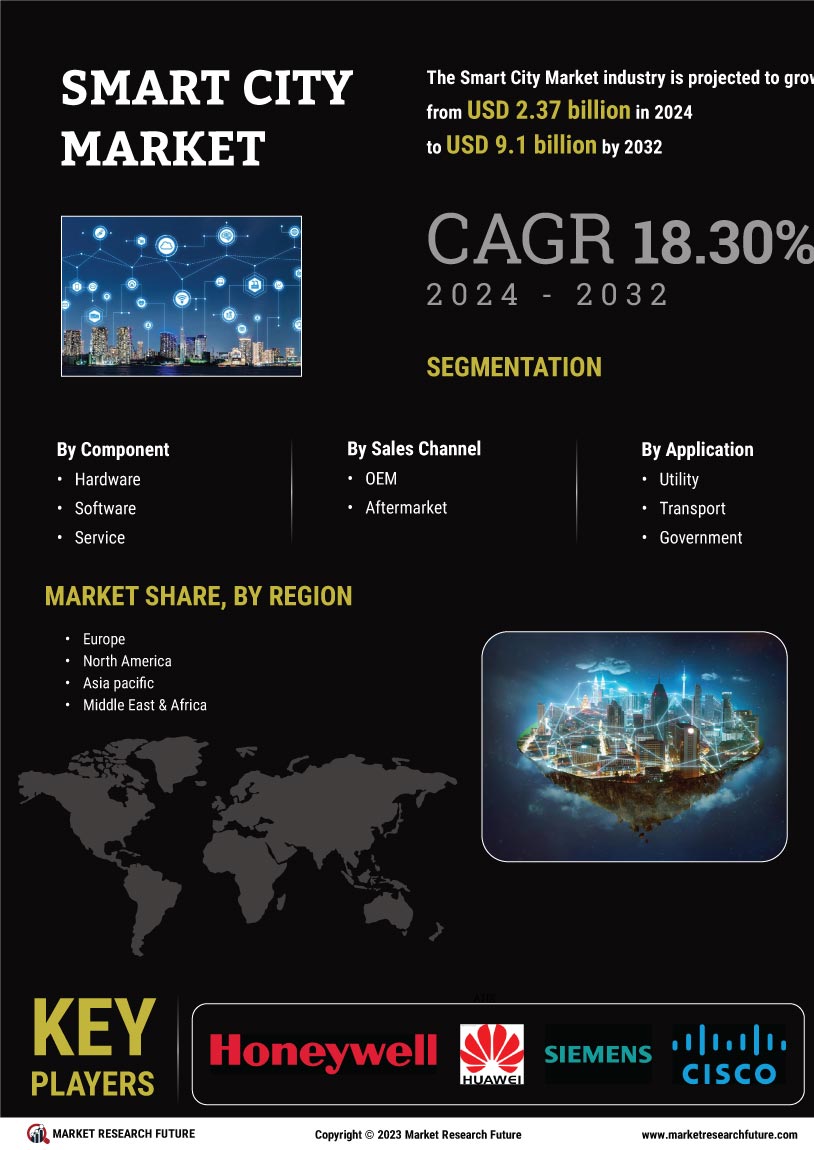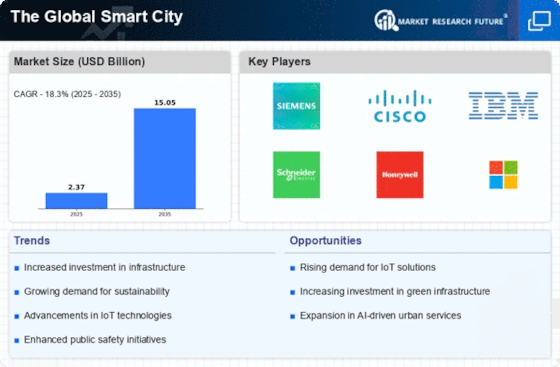Market Growth Projections
The Global Smart City Market Industry is poised for substantial growth, with projections indicating a rise from 2.37 USD Billion in 2024 to 15.1 USD Billion by 2035. This growth reflects the increasing adoption of smart technologies across urban landscapes. The anticipated CAGR of 18.31% from 2025 to 2035 underscores the potential for innovation and investment in smart city solutions. As cities worldwide embrace digital transformation, the demand for integrated systems that enhance efficiency and sustainability is likely to escalate, shaping the future of urban living.
Public Safety and Security
Public safety and security concerns are significant drivers of the Global Smart City Market Industry. As urban populations grow, the need for enhanced safety measures becomes critical. The market is expected to expand, reaching 15.1 USD Billion by 2035, as cities invest in smart surveillance systems and emergency response technologies. For instance, cities like New York are utilizing advanced analytics and AI to improve crime prevention strategies and emergency response times. By leveraging technology, urban areas can create safer environments for residents, thereby increasing the attractiveness of smart city initiatives.
Technological Advancements
Technological advancements are a key driver in the Global Smart City Market Industry, facilitating the integration of IoT, AI, and big data analytics into urban management. These technologies enable cities to optimize resource allocation, enhance public services, and improve citizen engagement. The market is expected to grow significantly, with projections indicating a rise to 15.1 USD Billion by 2035. For example, smart lighting systems in cities like Los Angeles have demonstrated energy savings of up to 60 percent, illustrating how technology can lead to sustainable urban development. As cities adopt these innovations, the demand for smart city solutions is likely to increase.
Environmental Sustainability
Environmental sustainability is increasingly influencing the Global Smart City Market Industry as cities seek to reduce their carbon footprints and promote green practices. The market is projected to grow at a CAGR of 18.31% from 2025 to 2035, driven by the adoption of eco-friendly technologies. Initiatives such as smart waste management and renewable energy integration are becoming commonplace in urban areas. For example, cities like Copenhagen are implementing smart grids and sustainable transportation systems to minimize environmental impact. This focus on sustainability not only addresses climate change but also enhances the quality of life for residents, making smart cities more attractive.
Government Initiatives and Funding
Government initiatives and funding play a crucial role in the Global Smart City Market Industry. Many governments are prioritizing smart city projects to enhance urban living and drive economic growth. In 2024, the market is anticipated to reach 2.37 USD Billion, largely due to public sector investments in infrastructure and technology. For instance, the European Union has allocated substantial funds to support smart city projects across member states, focusing on sustainability and innovation. This financial backing not only accelerates the development of smart solutions but also encourages private sector participation, creating a collaborative environment for urban transformation.
Urbanization and Population Growth
The Global Smart City Market Industry is experiencing a surge driven by rapid urbanization and population growth. As cities expand, the need for efficient infrastructure and services becomes paramount. By 2024, the market is projected to reach 2.37 USD Billion, reflecting the increasing demand for smart solutions that enhance urban living. Governments worldwide are investing in smart technologies to manage resources effectively, improve public safety, and enhance transportation systems. For instance, cities like Singapore and Barcelona are implementing smart traffic management systems to alleviate congestion and reduce emissions, showcasing the potential of smart city initiatives in addressing urban challenges.

















